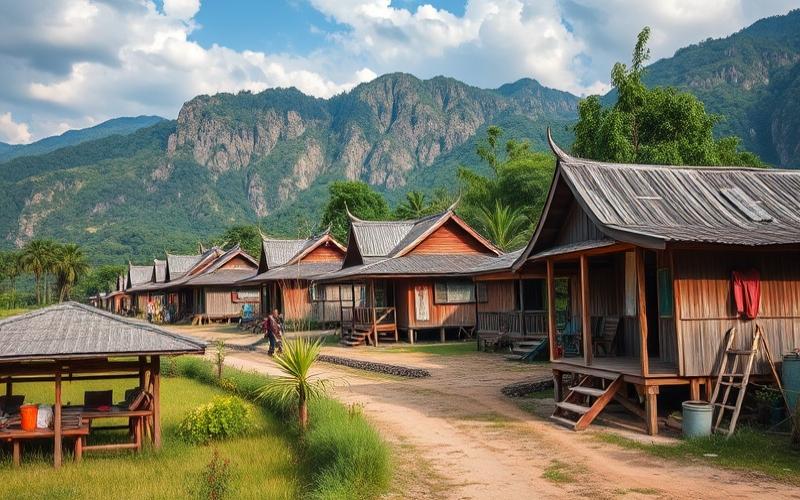
 Published on and written by Cyril Jarnias
Published on and written by Cyril Jarnias
Investing in Thailand: Mandatory Real Estate Insurance
Thailand, with its breathtaking landscapes and booming real estate market, is attracting more and more foreign investors eager to establish themselves in this land. However, embarking on such a venture requires a thorough understanding of the mandatory insurance that governs the local real estate sector.
This article examines the different types of insurance required to secure a real estate investment in Thailand, highlighting the essential legal nuances and specific application procedures in this country.
Whether you’re a buyer, tenant, or developer, understanding these insurance policies is crucial to protecting your interests and ensuring the longevity of your investment under the Thai sun.
Good to know:
Real estate insurance in Thailand can vary by region and property type. It is recommended to consult a local expert before any investment.
Understanding Home Insurance in Thailand: Legal Requirements and Available Options
Legal Requirements for Home Insurance in Thailand
- No general requirement: Home insurance is not legally mandatory for most types of real estate properties (single-family homes, apartments, etc.).
- Exception for mortgaged properties: Fire insurance may become mandatory if the property serves as collateral for a mortgage loan; this aims to protect the bank against property destruction.
- Condominiums: Some condominiums contractually impose minimum insurance (often through the condominium regulations), but this is not a national legal requirement.
| Property Type | Mandatory Insurance? | Details |
|---|---|---|
| Single-family home | No (except bank requirement) | Fire insurance required if mortgaged, otherwise optional |
| Condominium | Sometimes required by condominium, otherwise no | May be included in management fees; individual coverage recommended |
| Rental apartment | No | Optional for tenant; recommended for personal belongings |
Available Insurance Options
- For property owners
- Fire insurance (sometimes mandatory with mortgage)
- Home insurance (multi-risk)
- Natural disaster coverage (floods, storms, earthquakes)
- Theft and vandalism
- Owner’s liability insurance
- For tenants
- Contents insurance (personal property)
- Tenant liability insurance
- Option for coverage against theft or accidental damage
Common Types of Coverage
| Coverage Type | Description | Importance in Thailand |
|---|---|---|
| Fire | Damage caused by fire, explosion | High risk, often required |
| Natural disasters | Floods, storms, earthquakes | Highly recommended, risk areas |
| Theft and vandalism | Loss or damage from burglary or vandalism | Varies by area |
| Water damage | Damage caused by leaks, pipe bursts | Frequent, especially during rainy season |
| Liability | Damage caused to third parties (e.g., visitor injury) | Essential legal protection |
Importance of Insurance Types in the Thai Context
- Fire: Frequent in dry season, major risk especially in urban and rural areas.
- Natural disasters: Seasonal floods very common in many regions, particularly Bangkok and the north of the country.
- Theft: Less common in some secure residential areas, but remains a risk to consider.
- Liability: Essential to avoid financial consequences of a domestic accident involving a third party.
Examples of Well-Known Insurance Providers in Thailand
- Muang Thai Insurance
- Bangkok Insurance
- Allianz Ayudhya
- AXA Thailand
- Thai Life Insurance
Criteria to Consider When Choosing Home Insurance
- Scope of coverage (inclusions or exclusions)
- Deductible level and compensation limits
- Speed and reputation of customer service
- Specific clauses for local risks (floods, earthquakes)
- Annual premium cost
- Possibility to add options (valuables, specific equipment)
- Claim reporting and compensation conditions
Key takeaway:
Home insurance is largely optional in Thailand, except for mortgaged properties or according to certain condominium regulations. Coverage adapted to local risks (floods, fires) is strongly recommended to protect your assets and avoid significant financial losses.
Good to know:
In Thailand, home insurance is not legally mandatory, except in condominiums where certain regulations may require coverage. For single-family homeowners and tenants, purchasing insurance remains optional but strongly advised for protection against risks such as fires, natural disasters like floods, theft, and liability. Available options often include multi-risk policies adapted to Thai specifics, which is crucial given the prevalence of severe weather. Among reputable insurers are Muang Thai Insurance and AXA, known for their flexible policies and extensive coverage. When selecting insurance, it’s important to verify the scope of guarantees, possible exclusions, as well as the insurer’s reputation and customer service, to ensure adequate protection of your property in various situations.
Owner’s Liability Insurance: What You Need to Know for Effective Protection
Owner’s Liability Insurance in Thailand
Legal Obligations of Property Owners
- The owner must ensure that the property is in rentable condition and maintained, in compliance with the Thai Civil and Commercial Code.
- They must return the security deposit within 30 days after the lease ends, if no damage or unpaid bills are found.
- They must comply with legal procedures for termination and lease management, especially for contracts over three years that must be registered.
- In case of proven negligence (e.g., lack of maintenance causing damage to others), the owner’s liability may be engaged.
Types of Damage Covered by Owner’s Liability Insurance
| Type of Damage | Generally Covered |
|---|---|
| Bodily injury to third parties | Yes |
| Property damage caused to others | Yes |
| Damage to structures and constructions | Yes (depending on contract) |
| Damage due to natural disasters (flood, earthquake, storm) | Rarely included, optional |
| Damage caused by vandalism, explosion, falling objects | Often included |
| Personal property (artworks, jewelry) | Option depending on contract |
- Standard contracts in Thailand often exclude damage from floods, which are frequent in some regions.
- Damage related to plumbing, finishes, appliances, and furniture may be covered by specific extensions.
Potential Consequences in Case of Negligence
- Obligation to compensate affected third parties, with risk of civil lawsuits.
- Risk of claim denial by insurance if negligence is proven (e.g., lack of maintenance, non-compliance with standards).
- Possibility of having to pay for repairs, restoration, or compensation from personal funds.
- Loss of rental income if the property becomes uninhabitable or if the owner’s reputation is affected.
Criteria for Choosing Appropriate Liability Insurance
- Scope of coverage: prioritize contracts covering not only liability but also frequent damages in the region (e.g., flood, storm).
- Compensation amounts: check limits and deductibles for each type of damage.
- Property specifics: adapt coverage to value, location (risk area), nature (apartment, single villa), and property use (long-term rental, seasonal).
- Exclusions and limitations: carefully read exclusions (flood, natural disasters) and purchase extensions if necessary.
- Insurer reputation: choose an insurer recognized locally for claim handling speed and financial strength.
- Adaptation to contractual requirements: some leases or condominiums impose minimum coverage levels.
Practical Tips for Assessing Adequate Coverage and Avoiding Pitfalls
- Compare multiple offers and request detailed quotes to understand coverage differences.
- Accurately assess the property’s reconstruction value and the value of movable property.
- Pay particular attention to exclusions regarding natural risks (floods, earthquakes), which are frequent in Thailand.
- Examine compensation timelines and conditions.
- Keep evidence of regular property maintenance and compliance with safety standards.
- Avoid “low-cost” policies that often have many exclusions and insufficient coverage limits.
- If in doubt, use a broker or advisor specialized in real estate insurance in Thailand.
⎯⎯⎯⎯⎯⎯⎯⎯⎯⎯⎯⎯
A wise property owner adapts their insurance coverage to their property’s value, local risks, and carefully reads exclusions to avoid bad surprises in case of a claim.
⎯⎯⎯⎯⎯⎯⎯⎯⎯⎯⎯⎯
Good to know:
In Thailand, it is crucial for property owners to purchase liability insurance that covers damages caused to third parties, whether bodily injuries or property damage resulting from the condition of their property. Thai legislation sometimes requires this coverage, depending on the nature of the property, and the absence of it can lead to heavy financial penalties. To choose appropriate insurance, owners should assess the value of their assets, the frequency of potential risks, and check specific exclusions in the local market, such as damage caused by natural disasters frequent in this region. It is advisable to compare multiple insurance policies to avoid excessive premiums while ensuring adequate coverage that includes, for example, legal fees in case of disputes. Taking the time to properly understand insurance terms helps avoid pitfalls such as high deductibles or insufficient coverage for common claims.
Comparing Home Insurance in Thailand: Criteria and Practical Tips
| Criterion | Local Insurers | International Insurers |
|---|---|---|
| Natural disaster coverage | Often limited (floods and earthquakes sometimes excluded or optional). Specific add-on needed depending on geographic area. | More comprehensive offers but higher cost; floods and earthquakes generally included as standard or via options. |
| Theft and accidental damage | Protection against burglary, vandalism, glass breakage, water damage. Frequent exclusions (high-risk areas, valuables). | Broad coverage, often “all-risk,” higher reimbursement amount, better options for valuables. |
| Liability | Generally included, but sometimes low limits. | Higher limits, extension options for expatriates or specific needs. |
| Services and customer experience | Faster procedures, interface in Thai or English. Customer service sometimes limited for non-Thais. | Multilingual support, international claim management, 24/7 assistance. |
| Cost | Low annual premium (starting from 600 THB/year), depending on coverage. | Premium 2 to 5 times higher, justified by extended coverage and service. |
| Legal requirements | Fire insurance mandatory if property mortgaged. No general requirement for owners or tenants, except for condos where basic insurance is required by the condominium. | Same requirements compliance, with additional administrative layer. |
Main Advantages and Disadvantages
- Local insurers
- Advantages: Competitive prices, adaptation to local market realities, fast subscription.
- Disadvantages: Frequent exclusions (floods, earthquakes), communication difficulties for non-Thais, limitation on valuable property coverage.
- International insurers
- Advantages: Extensive coverage, simplified claim management for expatriates, multilingual assistance, better reputation with international clientele.
- Disadvantages: Higher cost, sometimes stricter subscription requirements, premium payment in foreign currency.
Practical Tips for Choosing the Right Home Insurance
- Compare coverage: Check if local natural risks (floods, earthquakes, storms) are included by default or as options.
- Analyze compensation limits: Ensure covered amounts match the actual value of the property and its contents.
- Examine exclusions: Carefully read exclusion clauses (flood zones, valuables, wear and tear).
- Evaluate insurer reputation: Consider customer reviews, claim handling speed, and financial strength.
- Request detailed quotes: Prices vary significantly by location, area, property use (primary or secondary residence), and insured profile.
- Check contract language: For expatriates, prefer contracts available in English or French and adapted customer service.
- Consider after-sales service: Ease of claim reporting and compensation is a key criterion.
Legal Requirements and Local Specificities
- Fire insurance is mandatory for any real estate property financed by a mortgage loan.
- For condominiums, basic insurance (structure only) is imposed by building management, but it does not cover personal property or individual liability.
- No requirement for tenants, but strongly advised.
- Administrative procedures often require proof of ownership or rental, and sometimes a visa or work permit for expatriates.
Cultural and Administrative Particularities
- Contracts are generally annual and renewable, but early termination can be complex.
- Compensation can be lengthy and require many documents (photos, estimates, invoices).
- Thai insurers prefer communication in Thai, although some players offer assistance in English, especially in Bangkok or tourist areas.
- The concept of “force majeure” (natural disaster) is sometimes interpreted restrictively, hence the importance of obtaining the precise list of covered risks.
Key Takeaways
- For expatriates: prefer international insurers or specialized brokers to benefit from adapted coverage and multilingual support.
- For locals: compare local offers, ensure coverage of climate risks specific to the region, and do not neglect liability.
Carefully compare exclusions, coverage amounts, and customer service quality before subscribing. If in doubt, consult a broker or lawyer specialized in insurance to avoid bad surprises.
Good to know:
In Thailand, choosing home insurance requires comparing several essential criteria such as coverage for natural risks like earthquakes and floods, protection against theft and accidental damage, and liability options. Local insurers may offer competitive prices and better understanding of cultural constraints, while international insurers are often reputed for their reliability and customer service. Expatriates should check specific exclusions to avoid surprises, while local residents can benefit from advice from social networks or forums. Regarding legal obligations, although home insurance is not always mandatory, it is highly recommended for those with real estate property, due to frequent weather hazards. Comparing costs, carefully reading customer reviews, and checking the insurer’s reputation are crucial steps to select the coverage most suited to your needs in Thailand.
Rental Risk Coverage: How to Choose the Best Insurance for Your Needs
Overview of Rental Risks in Thailand and Importance of Coverage
Thailand presents various rental risks, including fires, seasonal floods (especially in Bangkok and Chiang Mai), storms, earthquakes, theft, vandalism, and water damage. These events can cause significant material losses, affect tenant safety, and lead to legal liabilities for property owners. Covering these risks with insurance is essential to protect your real estate investment, guarantee financial security against claims, and safeguard against potential lawsuits or costly repairs.
Types of Insurance Available for Tenants and Owners in Thailand
- Fire insurance: often mandatory for mortgaged properties, it covers damage from fire, explosion, and sometimes water damage during firefighting.
- Home insurance: broader protection, generally including natural disasters (floods, storms, earthquakes), theft, vandalism, and sometimes liability.
- Liability insurance: protects against lawsuits or claims for damages caused to others in the residence (third-party injury, damage to neighbors).
- Personal property insurance: covers valuable personal effects (jewelry, artworks, electronics).
- All-risk insurance: extensive contracts encompassing most potential claims, sometimes with specific extensions.
Comparison Table of Main Insurance Companies in Thailand
| Company | Indicative Price (Annual) | Customer Service Quality | Included Coverages | Typical Exclusions |
|---|---|---|---|---|
| AXA | Medium/High | Very good | Fire, theft, flood, liability | Intentional damage, normal wear and tear |
| Allianz Ayudhya | Medium | Good | Fire, theft, liability | Natural disasters without option |
| Bangkok Insurance | Medium/Low | Good | Fire, water damage, liability | Theft without break-in, flood |
| MSIG Insurance | Medium | Very good | All-risk, personal property option | War-related damage, terrorism |
Prices vary by location, insured value, and chosen options. Frequent exclusions are damage due to wear and tear, intentionally caused claims, or certain natural risks if not included as options.
Essential Criteria for Choosing Rental Insurance
- Amount and scope of personal property coverage
- Liability coverage (damage to third parties or neighbors)
- Coverage of major risks (fire, flood, theft, vandalism)
- Legal protection in case of dispute
- Deductible and compensation limits
- Flexibility of options (adding specific guarantees)
- Reputation and responsiveness of customer service
- Ease and speed of compensation
Steps to Subscribe to Rental Insurance in Thailand
- Compare offers and select the appropriate company and contract.
- Fill out a subscription form (online or in agency).
- Provide required documentation:
- Copy of passport and visa
- Rental contract or property title
- Inventory of property to insure
- Photos of premises or valuable property (if required)
- Risk assessment procedure by insurer (possible visit, analysis of location and equipment).
- Payment of premium and receipt of insurance certificate.
Tips to Save on Insurance Premiums
- Opt for a higher deductible (premium reduction)
- Bundle multiple insurance policies with the same insurer for discounts
- Protect the residence (alarms, reinforced locks, smoke detectors)
- Cover only the actual value of property (avoid over-insurance)
- Regularly compare offers and renegotiate at each renewal
Legal and Regulatory Obligations in Thailand Regarding Rental Insurance
- There is no general insurance requirement for real estate properties in Thailand, except in the case of mortgaged property where fire insurance is often required by the bank.
- Subscription therefore remains mostly voluntary, but some rental contracts may require specific insurance (check the lease).
- Insurers are required by law to clearly state policy conditions and exclusions.
- Coverage for floods and certain natural disasters must be explicitly mentioned in the contract, otherwise they will not be compensated.
Good to know:
In Thailand, covering rental risks is crucial to protect tenants and property owners against uncertainties. Available insurance ranges from home insurance, which covers personal property, to liability insurance, important for potential damages caused to other tenants or neighbors. Companies like Muang Thai and AXA, well-known for their customer service and extensive coverage, offer varied products, although often accompanied by specific exclusions. When choosing insurance, evaluate property coverage, liabilities, and legal protection, while comparing premiums and service quality. Subscribing to insurance generally requires property and identity documents; it is advisable to request a prior risk assessment to better adapt your coverage. To save, consider bundling your policies or increasing deductibles. Keep in mind that while not legally mandatory, insurance may be required by your landlord, thus influencing your choice.
Always check exclusions, limits, and conditions of each contract. Adapt coverage to your geographic situation (frequent floods in certain areas) and the value of your property.
Disclaimer: The information provided on this website is for informational purposes only and does not constitute financial, legal, or professional advice. We encourage you to consult qualified experts before making any investment, real estate, or expatriation decisions. Although we strive to maintain up-to-date and accurate information, we do not guarantee the completeness, accuracy, or timeliness of the proposed content. As investment and expatriation involve risks, we disclaim any liability for potential losses or damages arising from the use of this site. Your use of this site confirms your acceptance of these terms and your understanding of the associated risks.



















































